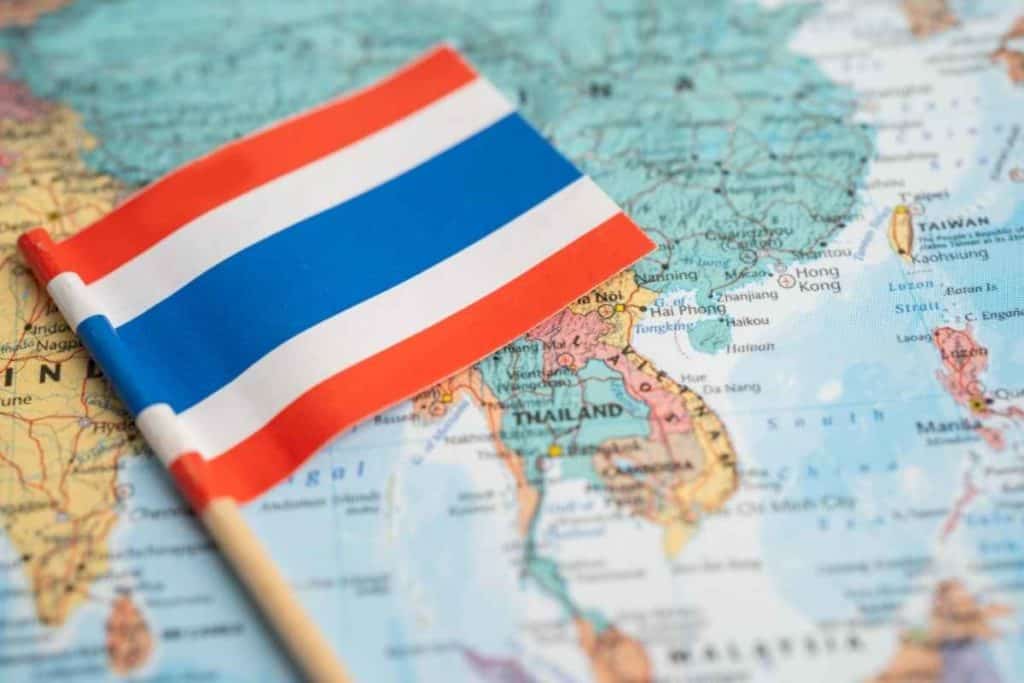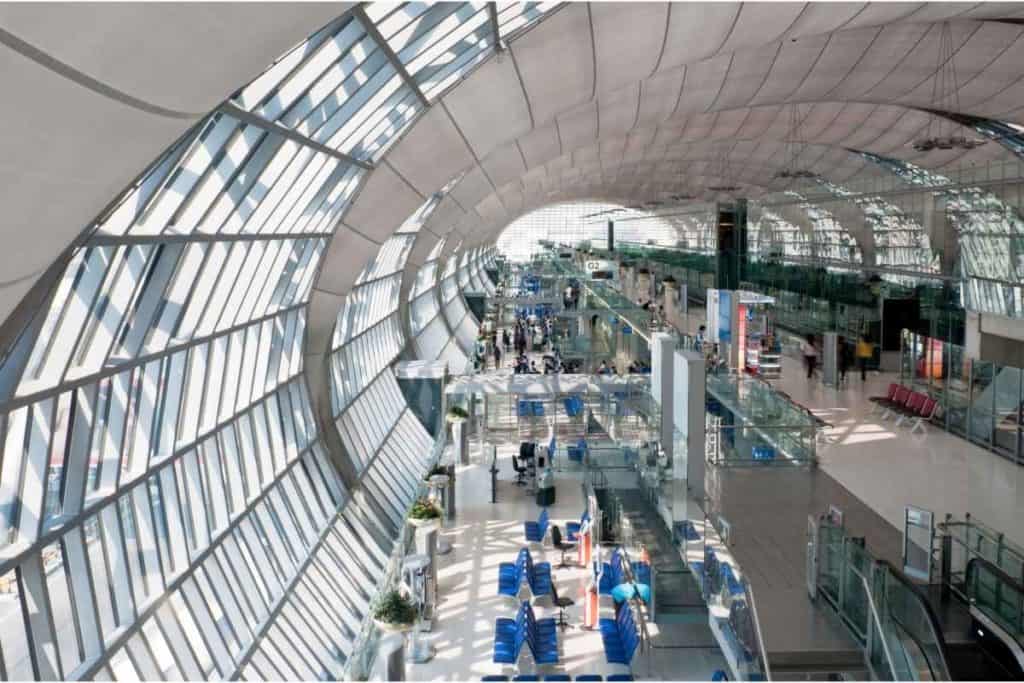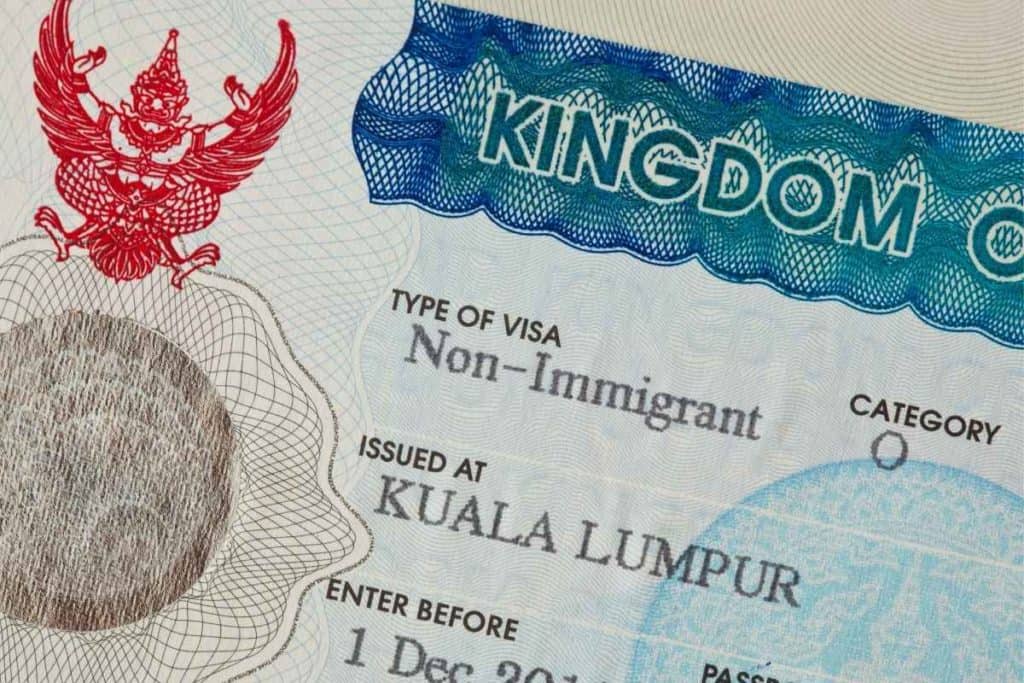Known for its unique culture, tropical beaches, and warm hospitality of local people, Thailand often tops the list for attracting tourists and expats. There can be no denying its status as one of the most desired destinations in Asia.
But if you are less familiar with the country, you might be wondering why? This article looks at the advantages of Thailand and the reasons why so many foreigners choose to do business there.
1. Strategic Location in Asia

Thailand has the advantage of being located in a strategic location, making it a gateway to Asia for investors.
Geographically, Thailand is situated in the center of most of the countries in ASEAN, which grants easy access to the newly emerging markets of the Greater Mekong sub-region; with Myanmar on the west, Malaysia, Singapore, and Indonesia in the south, and Cambodia and Lao PDR on the east side of the country (3).
Being at the heart of ASEAN, Thailand also offers the advantage of convenience in trade with China and India markets. This allows people in Thailand to have access to a booming population of consumers overseas and the equally huge population of 66.19 million people (2020) in the country (4).
Thailand is also one of the founding members of ASEAN and has been instrumental in forming and developing the ASEAN Free Trade Area (AFTA) (1). As Thailand is the hub of ASEAN, it has always been a proponent of fair and free trade. These free trade agreements also enhance the country’s attractiveness as a production base for many international companies (1). All of these agreements with ASEAN countries provide many business and political advantages to Thailand.
2. World-Class Infrastructure

Another advantage of Thailand is that the country can offer a world-class infrastructure. Trading and doing business transactions in Thailand are made easier by the country’s extensive highway system, international airports, city-wide mass transit, deep seaports, and international river ports (3).
According to the Thailand Board of Investment, there are 38 airports in the country (5). Through its 6 main airports, international services are provided by many air carriers, including Thai Airways International, which is the country’s national carrier.
Thailand’s city-wide mass transit system is also being expanded into suburbs as the country’s development plans for 2012-2022 include a high-speed railway network that covers the north, west, east, and south of Thailand and southern China (1).
Likewise, the Thai highway system is being expanded. It now connects not only to every province of Thailand but also to the neighboring countries like Cambodia, Laos, and Vietnam (1) – making transportation and trading faster and easier.
For access to the sea, there are 6 deep seaports and 2 international river ports in Thailand, including tank farms, liquid jetties, and containers (1). In short, the country’s infrastructure covers all 3 main transportation methods – air, land, sea, making it attractive to visitors and investors.
3. Business Benefits for Investors

Thailand has many advantages to offer to foreign investors who want to do business. Thailand has consistently ranked among the most attractive locations for investments in international surveys. According to the 2014 World Bank’s Ease of doing business report, Thailand was ranked 18th place for the easiest country globally and 5th in the Southeast Asia region to do business in (1).
Also, the United Nations Conference on Trade and Development (UNCTAD) placed Thailand as the 8th most attractive host economy globally (1). These ranks have proved that Thailand is an attractive market for foreign investors.
Proactive Government Policies:
Thai society (especially the entrepreneurial society) is also very accepting of foreign companies that want to establish their operations in Thailand. The world-class infrastructure (mentioned above) can also help investors, and their companies hit the ground running.
Thailand’s government is also highly innovative and proactive in its approach toward foreign investments and is keen to promote socio-economic development and advancement. And that’s why foreign investment (both in terms of human capital and financial) is welcomed in Thailand.
Over the past two decades, the government and authorities of Thailand have worked toward making Thailand’s environment more receptive to foreign organizations and their businesses (6). Thailand’s investment policies are well-defined and focus on liberalization and encouraging free trade.
Through the Board of Investment, the government offers a range of tax incentives, import duty exemptions, support services, or an extensive list of promoted activities reductions. And companies that receive investment promotion privileges from the Thailand Board of Investment are not subjected to foreign equity restrictions in the manufacturing sector. There are also no local content requirements or export requirements.
This is because Thailand’s investment regime is in total compliance with regulations from WTO (1). In addition to the activities provided by the Board of Investment, other government organizations – such as the Department of Export Promotion and International Chambers of Commerce, also offer a lot of support to foreign investors and are hosts to other essential services. Foreign investments – especially those that contribute to the development of technology, skills, and innovation, are actively promoted by the Thai government (1).
Cost-Efficient and Educated Workforce:
One of the most significant advantages of doing business in Thailand would be the large, cost-efficient, and adaptable workforce. The workforce in Thailand is not just large but also highly versatile.
According to Thailand’s Board of Investment, 94% of all Thai males and 90% of all females in Thailand are literate.
Due to this, foreign investors can benefit from having a large pool of educated and skilled workforces that can be further developed and trained. In addition to being educated and flexible, the labor force in Thailand is also known for its cost-effectiveness compared to employees in Western countries. The average daily pay in Bangkok is around 433 THB which is equivalent to 13.5 USD (6).
4. Visa for Investors, Retirees, and Expats

According to International Living’s 2022 Global Retirement Index, Thailand was chosen as the No. 1 destination in Asia and 11th in the world for global retirees (2).
Recently in 2022, the Thailand government announced plans to launch a 10-year visa program for investors, retirees, and specialists who plan to stay in Thailand for a long term.
This 10-year visa program is made to attract wealthy international travelers from 4 categories (7):
i. Cosmopolitan Investors: The ones who travel frequently and have assets in different countries. An investor will need to invest at least 16.5 Million THB or $500,000 to obtain the visa. In a foreign direct investment format, investments are allowed in Thai real estate and Thai government bonds.
ii. Remote Employees: Digital nomads who want to live in Thailand while remotely working for a foreign company. Remote employees are not required to invest in government bonds or real estate.
iii. Pensioners over the age of 50: Like the cosmopolitan investors, pensioners also need to invest in real estate or government bonds, but the amount of investment required is half of what is required from the investors – $250,000. The annual income of the applicants also needs to be from $40,000 in health insurance with coverage of 100,000 or more.
iv. Highly skilled professionals: These specialists are the ones who move to Thailand to work in priority sectors of Thai’s economy – including university professors who teach subjects in the targeted industries. Applicants must have at least 5 years of experience in their industry and have an annual income of 40,000 and more.
The advantage of this long-term Thai visa is that foreigners will be allowed to begin working immediately upon entering Thailand. They will not need to wait for their work permit application to be issued (8).
10-year visa holders will be able to pay income tax from 0 to 35% on a progressive scale (7). And of course, these visa holders will be allowed to enter and leave the country without restrictions.
At first, the visa will be granted for 5 years for 10,000 THB per year. It can be extended to another 5 years after the initial term has expired. Since the total cost for 10 years would only be 100,000 THB, this long-term visa is significantly cheaper than the current long-term visa programs, such as the Thai Elite Visa program, which requires the applicant to pay 600,000 THB for a 5-year visa.
If interested, foreigners can submit their documentation and obtain the qualification certificates at the nearest Thai embassy or consulate. Or if they are already in Thailand, the Thai Board of Investment at Chamchuri Square in Bangkok (8).
5. Lower Cost of Living

Compared to other Southeast Asian countries like Singapore and Malaysia, Thailand’s cost of living is more on the reasonable side. Depending on where one lives, the cost of living in Thailand varies.
Big cities like Bangkok or Pattaya cost more than other smaller provinces. On average, most foreigners can live comfortably in Thailand for just under $2,000 per month (9). Rent is probably the biggest expense for anyone living in Thailand, especially in the downtown Bangkok area or tourist hubs like Phuket or Pattaya.
It has been said that expats spend over 30% of their monthly income on rent alone (10). The cost of rent for a 30-square-meter studio room in the middle of Bangkok costs around 12,000 THB to 15,000 THB per month in areas where many expats reside, such as Onnut.
While the prices can go up to 24,000 THB per month in business districts like Silom or Asok area. However, in Chiang Mai, the rental cost for a condo unit of the same size may only cost around 10,000 THB, even in the downtown area (10).
Therefore, even though the rental cost takes up a large portion of one’s income, it is not as expensive as it would have been in other major cities like Singapore, Hong Kong, London, and New York.
Other expenses such as food and transportation are way cheaper than they would cost in western countries. One meal in Thailand costs around 60 THB on average, while one MRT or BTS train ride costs around only 30 THB. These relatively inexpensive living costs make Thailand more advantageous for expats who want to save money and enjoy the world-class infrastructure and delicious food!
6. Friendly Locals

Thailand is famous throughout the world for the gracious hospitality of its local people. Nicknamed the ‘Land of Smiles,’ Thai people are very welcoming and helpful towards foreigners.
In 2021, Thailand ranked 5th in ‘The world’s friendliest countries on the Rough Guides’ survey (11). The approachable nature of local people and the diverse culture of Thailand contribute to an environment where foreign visitors can feel safe and at home in Thailand.
That’s why in the year 2017, Thailand made the list (again, coming in at number 5) of the ‘Top 10 Friendliest Destinations For Families Living Abroad’ by InterNations annual Expat Insider survey (12). This further supports the advantages of Thailand, as it’s simply human nature to visit a country where you feel accepted and welcomed by the local people.
7. Ideal for Travel

Aside from the man-made advantages, let’s not forget that Thailand is blessed with natural advantages. For those who want to enjoy the sun, snorkel, and seafood, there are many beautiful and exotic islands in southern Thailand. While, tourist destinations like Pattaya and Hua Hin are just a few hours’ drive away from the country’s capital, Bangkok.
For hikers and those who want to enjoy nature, northern parts of Thailand, such as Chiang Mai and Khao Yai are perfect destinations. Traveling inside Thailand is also very easy and convenient even for foreigners. Almost all ticketing systems – whether for the bus, train, or flights are available in English, and the prices are very affordable.
In today’s Covid-19 era, where travel is restricted, Thailand is perfect for those who want to travel as it has the advantage of having different beautiful sceneries in the country.
Conclusion
Thailand certainly has a lot of advantages to offer, whether it’s for leisure, business, or retirement. Even though Thailand has its downsides, such as not everyone can speak English or political instability, it remains an attractive destination for foreigners.
It is an undeniably beautiful country with world-class infrastructure, delicious cuisines, and friendly local people. With the diverse cultures co-existing in the country, Thailand is very welcoming, which is perhaps the ultimate advantage it has compared to other countries.
Like always, if you want to discover more about Thailand, stay guided with ThaiGuider. You might learn something you never knew about this unique country.
References
1. Asia Cold Chain Show. Thailand’s Advantages. Asia Cold Chain Show. [Online] [Cited: February 11, 2022.] https://www.asiacoldchainshow.com/thailands-advantages/.
2. Pornbanggird, Sirakij and Thadaphrom, Thammarat. Thailand Named #1 Destination In Asia For Global Retirees. NATIONAL NEWS BUREAU OF THAILAND (NNT). [Online] January 10, 2022. https://thainews.prd.go.th/en/news/detail/TCATG220110125832301/.
3. Invest In ASEAN. ASEAN Advantage. Invest In ASEAN. [Online] [Cited: February 11, 2022.] http://investasean.asean.org/index.php/page/view/asean-member-states/view/709/newsid/862/thailand.html/.
4. Ministry of Labor And National Statistical Office of Thailand. Demographic. Thailand Board Of Investment. [Online] July 28, 2021. https://www.boi.go.th/index.php?page=demographic.
5. Thailand Board Of Investment. Airports. Thailand Board of Investment. [Online] October 30, 2020. https://www.boi.go.th/index.php?page=airports.
6. Aadmi Consulting. 5 Benefits Of Doing Business In Thailand. Aadmi. [Online] July 27, 2021. https://aadmi.com/5-benefits-of-doing-business-in-thailand/.
7. Алевтина Калмук. Thailand Will Start Issuing 10-Year Visas To Investors, Pensioners and Specialists. Immigrant Invest. [Online] September 27, 2021. https://immigrantinvest.com/en/insider/new-thai-visa/.
8. Coconuts Bangkok. 10-year Thai Visas For Digital Nomads, Flush Foreigners Get Cabinet OK. Coconuts. [Online] January 19, 2022. https://coconuts.co/bangkok/news/10-year-thai-visas-for-digital-nomads-flush-foreigners-get-cabinet-ok/.
9. International Living. Cost Of Living In Thailand. International Living. [Online] [Cited: February 13, 2022.] https://internationalliving.com/countries/thailand/cost-of-living-in-thailand/.
10. Lhawpongsawad, Saran. Cost Of Living In Thailand As An Expat: How Much Do You Need Per Month? (2022). ExpatDen. [Online] January 4, 2022. https://www.expatden.com/thailand/cost-of-living-in-thailand/.
11. Rough Guides Editors. The World’s Friendliest Countries – As Chosen By You. Rough Guides. [Online] November 8, 2021. https://www.roughguides.com/gallery/the-friendliest-countries-in-the-world-as-chosen-by-you/.
12. Karnjanatawe, Karnjana. Friendly Thailand. Bangkok Post. [Online] April 20, 2017. https://www.bangkokpost.com/travel/1235190/friendly-thailand/.
13. Rough Guides Editors. The World’s Friendliest Countries – As Chosen By You. Rough Guides. [Online] November 8, 2021. https://www.roughguides.com/gallery/the-friendliest-countries-in-the-world-as-chosen-by-you/.
14. Karnjana Karnjanatawe. Friendly Thailand. Bangkok Post. [Online] April 20, 2017. https://www.bangkokpost.com/travel/1235190/friendly-thailand/.
THINKING ABOUT A TRIP TO THAILAND?
I am working on a FREE Thailand Travel Guide with a FULL 7 Day Itinerary. Be the first to receive it!
Thank you for signing up.
Something went wrong.
